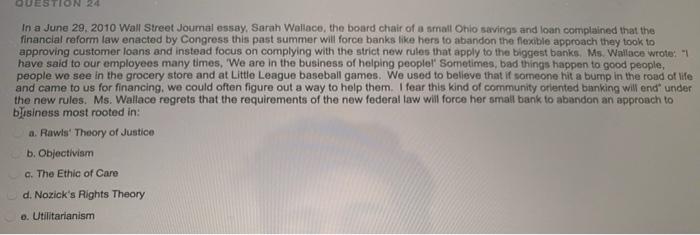QUESTION 31 According to Dr. Ryan and the in-class discussion about Integrative Social Contract Theory, the biggest advantage is: a. It enables people from different cultures to determine how broadly a norm is to be shared. b. It respects hypernorms. It acknowledges the legitimacy of different cultures having different cultures having different standards for approaching ethical dilemmas that come up in business. d. It is the only theory that can be applied on a global stage. e. It was intended to allow businesses to do business with other cultures. C. TION 24 In a June 29, 2010 Wall Street Joumal essay, Sarah Wallace, the board chair of a small Ohio savings and loan complained that the financial reform law enacted by Congress this past summer will force banks like hers to abandon the flexible approach they took to approving customer loans and instead focus on complying with the strict new rules that apply to the biggest banks, Ms. Wallace wrote: have said to our employees many times, 'We are in the business of helping people!' Sometimes, bad things happen to good people, people we see in the grocery store and at Little League baseball games. We used to believe that if someone hit a bump in the road of life and came to us for financing, we could often figure out a way to help them. I fear this kind of community oriented banking will end under the new rules. Ms. Wallace regrets that the requirements of the new federal law will force her small bank to abandon an approach to business most rooted in: a. Rawis Theory of Justice b. Objectivism c. The Ethic of Care d. Nozick's Rights Theory o. Utilitarianism QUESTION 25 In a March 29, 2010 essay in the Wall Street Journal, American Konrad Huber working in Brazil wrote that Brazilian business executives generally "are extremely kind and generous toward those whom they know, even indirectly. But my experience has been that their main preoccupation is with taking care of themselves and acquaintances first, and then worrying about the welfare of others later, if at all. I Mr. Huber is right, the typical Brazilian executive follows an ethics: a. Rooted exclusively in Objectivism, and that rejects Nozick's Rights Theory b. Rooted in a blend of Objectivism and the Ethic of Care, and that rejects Utilitarianism. c. Rooted in a blend of Rawls' Theory of Justice and the Ethic of Care, and that rejects Objectivism. d. Rooted exclusively in Objectivism. e. Rooted in Rawls' Theory of Justice, and that rejects the Ethic of Care and Nozick's Rights Theory









